|
|
|
Sort Order |
|
|
|
Items / Page
|
|
|
|
|
|
|
| Srl | Item |
| 1 |
ID:
114581
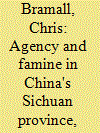

|
|
|
|
|
| Publication |
2011.
|
| Summary/Abstract |
A revisionist literature on the Great Chinese Famine has emerged in recent years. These revisionists focus primarily on the question of agency. They claim that that neither poor weather nor the excesses of local cadres can explain the extent of mortality; rather, responsibility lies squarely with Mao and the CCP leadership. Using county-level data on mortality, output, rainfall and temperature for Sichuan province, I argue that this revisionist view is unconvincing. Weather admittedly played only a minor role, and the zealotry of the Party centre contributed significantly to the death toll. However, variations in mortality between Sichuan's counties appear to have been essentially random - suggesting that differences in local cadre responses to central government policy were decisive in determining the scale of famine.
|
|
|
|
|
|
|
|
|
|
|
|
|
|
|
|
| 2 |
ID:
136288
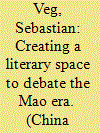

|
|
|
|
|
| Summary/Abstract |
Since the scar literature of the early 1980s, fiction and fictionalised autobiography have played an important role in bringing to light the mass violence of the Cultural Revolution. However, these texts remained within a well-defined framework in which the political system itself was not questioned. Over the last decade, by contrast, the Chinese literary field has focused more specifically on the 1950s, with works such as Yang Xianhui’s Chronicles of Jiabiangou (Tianjin, 2002), and Yang Jisheng’s Tombstone (Hong Kong, 2008). This paper focuses on Yan Lianke’s Four Books (Hong Kong, 2010), a full-fledged fictionalisation in a fantastic mode of the famine of the Great Leap Forward in a village on the Yellow River. Considering literature in the context of theories of the public sphere, it suggests that Yan’s book aims to broaden decisively the discussion on certain previously out-of-bounds aspects of the Mao era, an aim only partially thwarted by its failure to be published within mainland China. Four Books, like Yang Jisheng and Yang Xianhui’s works, thus represents an attempt to call into question the original legitimacy of the PRC polity and to create debate within the Chinese-speaking public sphere on the foundations of the current regime.
|
|
|
|
|
|
|
|
|
|
|
|
|
|
|
|
| 3 |
ID:
149307
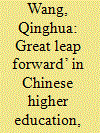

|
|
|
|
|
| Summary/Abstract |
This article begins with a clarification of the chronology of the ‘Great Leap Forward’ in Chinese higher education following the 1999 decision to expand. It then provides an in-depth examination of the leapfrogging story by focusing on why universities commonly adopted a development strategy that stressed it was better ‘to become larger and more comprehensive’. The author argues that this strategy and its associated ‘abnormal’ university behavior, particularly in cases where local universities ignored the Ministry of Education directives to slow down enrollment expansion in 2000–2005, were driven by two incentives: (1) to attain a higher bureaucratic rank or status; and (2) to obtain more government funds and more tuition. These two incentives were shaped by the bureaucratic control and management system, and the government funds allocation system respectively. The article concludes with a discussion of the larger implications of this study.
|
|
|
|
|
|
|
|
|
|
|
|
|
|
|
|
| 4 |
ID:
072720
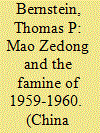

|
|
|
|
|
| Publication |
2006.
|
| Summary/Abstract |
In late autumn 1958, Mao Zedong strongly condemned widespread practices of the Great Leap Forward (GLF) such as subjecting peasants to exhausting labour without adequate food and rest, which had resulted in epidemics, starvation and deaths. At that time Mao explicitly recognized that anti-rightist pressures on officialdom were a major cause of "production at the expense of livelihood." While he was not willing to acknowledge that only abandonment of the GLF could solve these problems, he did strongly demand that they be addressed. After the July 1959 clash at Lushan with Peng Dehuai, Mao revived the GLF in the context of a new, extremely harsh anti-rightist campaign, which he relentlessly promoted into the spring of 1960 together with the radical policies that he previously condemned. Not until spring 1960 did Mao again express concern about abnormal deaths and other abuses, but he failed to apply the pressure needed to stop them. Given what he had already learned about the costs to the peasants of GLF extremism, the Chairman should have known that the revival of GLF radicalism would exact a similar or even bigger price. Instead, he wilfully ignored the lessons of the first radical phase for the sake of achieving extreme ideological and developmental goals.
|
|
|
|
|
|
|
|
|
|
|
|
|
|
|
|
| 5 |
ID:
175565
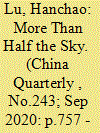

|
|
|
|
|
| Summary/Abstract |
From the Great Leap Forward (GLF) of 1958–1960 onwards, China's urban neighbourhood workshops and services mostly hired women. The GLF marked the beginning of a large-scale and irreversible trend towards near universal employment of women in China's cities. By the end of the Mao era, about 42 per cent of women working in industry were employed in “collectives” that were largely developed from urban neighbourhood industry. This article takes Shanghai as a case study to examine this type of employment for women in China. It documents the origin and development of the institution, explores the nuances of state–labour interactions at its site, and argues that as far as the enduring effects of women's participation in the workforce are concerned, the disastrous GLF was indeed the initiator and in this respect may well be seen as a blessing in disguise.
|
|
|
|
|
|
|
|
|
|
|
|
|
|
|
|
| 6 |
ID:
139858
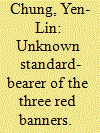

|
|
|
|
|
| Summary/Abstract |
As a senior member of the Chinese Communist Party Politburo, second-in-command of the Central Secretariat and Party secretary of Beijing Municipality, Peng Zhen was trusted by Mao Zedong and exerted power and influence over Chinese politics during the period before the Cultural Revolution. However, the significance of his role in the Great Leap Forward has been underestimated and misunderstood. This article investigates Peng’s active leadership in major policies, including the mass steel-making campaign, the Anti-Right-Opportunist campaign and the people’s commune movement. Through examination of Peng Zhen’s role, this article endeavors to provide new insights into leadership politics at the time.
|
|
|
|
|
|
|
|
|
|
|
|
|
|
|
|
|
|
|
|
|